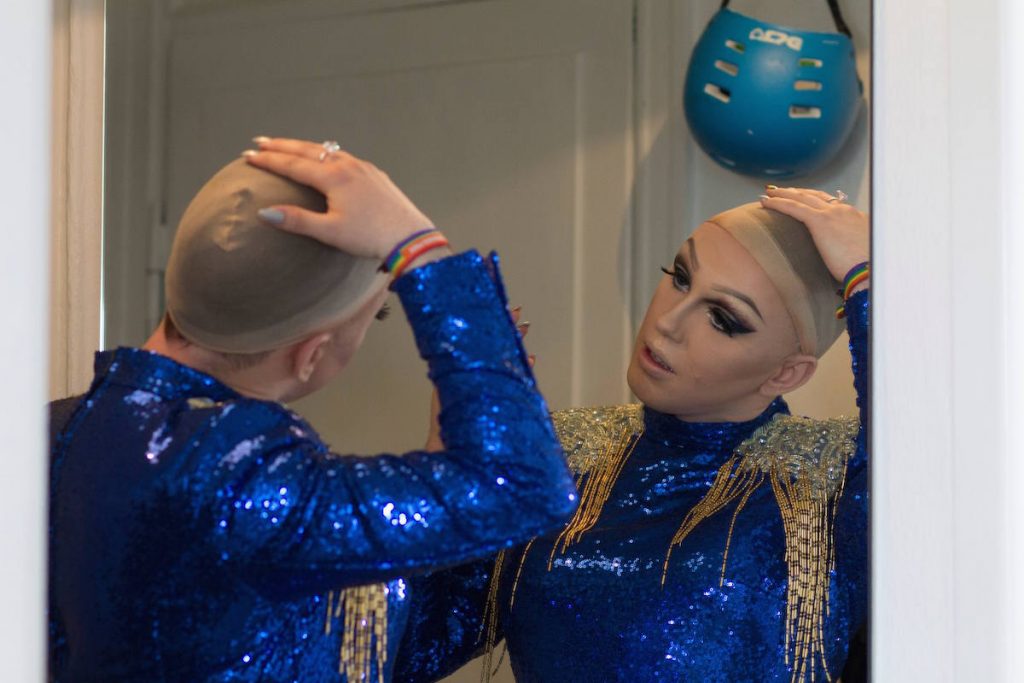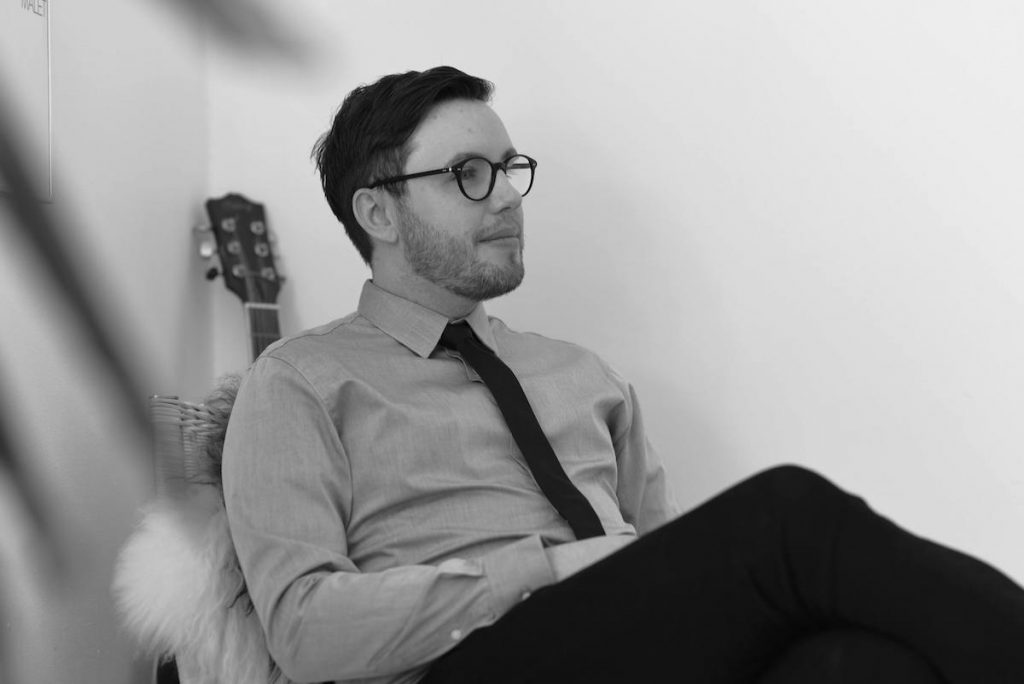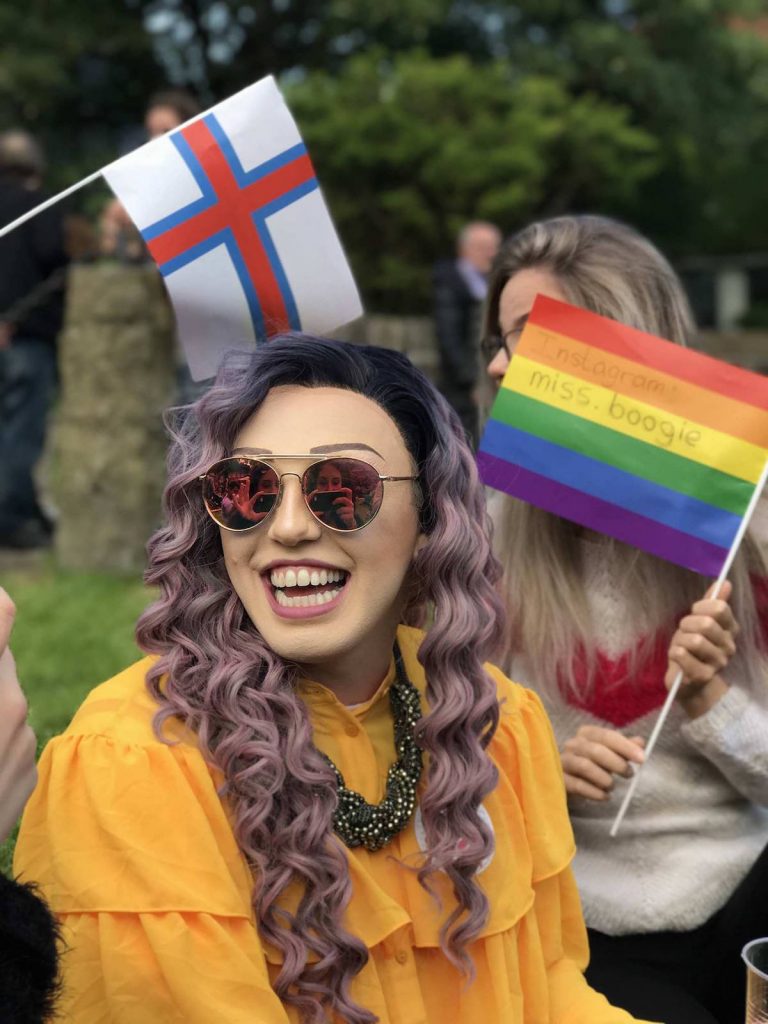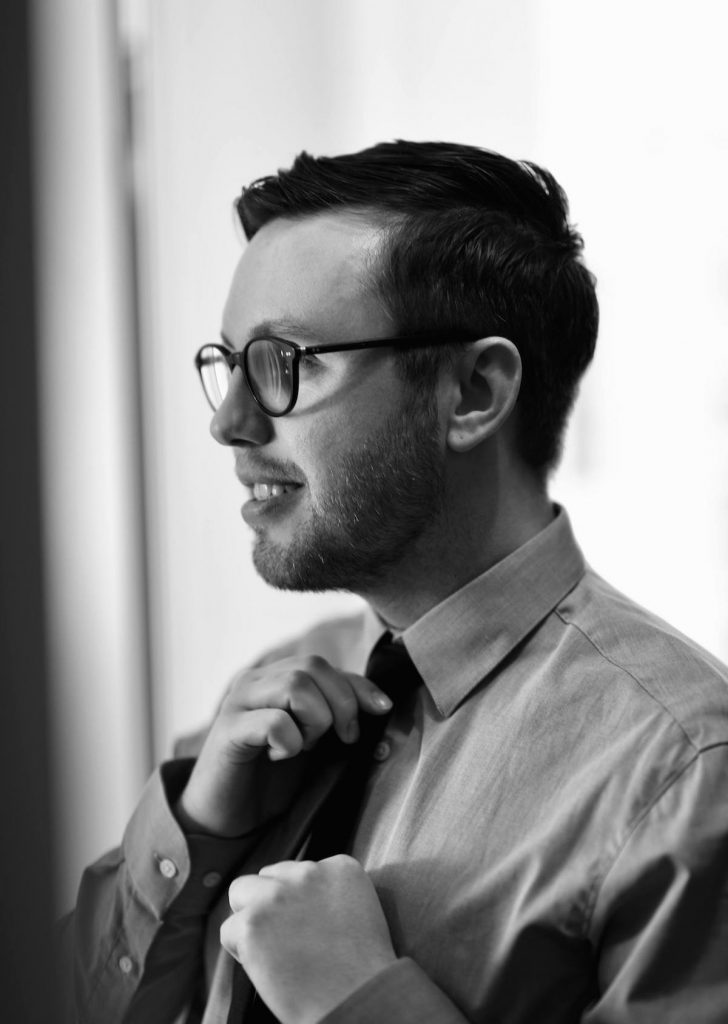As I sit opposite Finn Ferjá at our corner table inside the legendary Oscar’s Bar in Rådhuspladsen (central Copenhagen), it is as if there were glitter in the air. A quietly magical presence surrounds him as he sips on an Aperol Spritz with both a sharp professional demeanour and a twinkle in his eye.
Originally from the Faroe Islands, Ferjá is a diversity consultant and facilitator, activist for LGBTQIA+ rights, lecturer in gender and sexuality, speaker of Faroese, Danish, English and Mandarin Chinese and the sole creator of his infamous drag persona: Miss Boogie.
‘When I do drag it gives me a platform to convey messages that I am otherwise unable to convey because I don’t get the same attention when I’m Finn’, he says, as I question with whom I shall be speaking today. ‘What I’ve found over time is that I take parts of Finn with me when I’m in drag but also, when I step out of drag, I take the best parts of Miss Boogie with me too.’
The Giant Peach speaks to Finn Ferjá about the challenges of growing up as an LGBTQIA+ youth in the Faroe Islands, his unique relationship with drag and his latest diversity management project ‘Queens Consulting’ which aims to combine drag with educational presentations on diversity and inclusion.

How did you become involved in the drag scene?
About 6 years ago I was watching Ru Paul’s Drag Race and a few seasons in I thought ‘You know what, I could do that too, I wanna try it.’ I was quite insecure initially but I started to take very small steps. First, I bought my first pair of platform shoes. I remember there was this hallway outside my apartment. I just tried walking up and down outside for a moment and then rushed back inside. It was like a test run and I thought ‘OK, that wasn’t that bad.’ So, slowly but surely, I built my confidence from there. I went to Sephora and asked for some makeup samples. I whispered over the counter ‘Can I get some girls’ samples?’ and the lady was like, ‘Yeah of course!’, so I got a mascara.
I managed to convince a gay friend of mine to wear it as well and we tried going out one night wearing makeup. We’d had zero practice prior to this, so you can imagine it was kinda like two girls in high school doing their makeup for the first time (laughs). I also remember there was this drag house event at Vega, I think it was for Halloween. It was the perfect opportunity to dress up without feeling out of place. So, I gathered a few friends and we dressed up and went out together. That was really the start of everything.
I was also seeing a life coach at the time who’d just finished a three-year education and needed some test subjects. With him, I’d chosen to work on getting rid of my thoughts about what other people thought of me – especially the power I gave to other people in the process.
So, week by week there’d be new additions – a foundation, a lipstick, I ordered my first wig which was kind of a Kylie Jenner style. It was this light blue ombre wig, which was really in at that time.
And voila! I was in full drag before I knew it.
What is your academic background and how have you managed to combine academia with drag?
I have a BSc in Asian Studies, Business, Language & Culture (focusing on Japan and China with the extension of Mandarin language) and I also have an MSc in Diversity and Change Management. I’ve always wanted to combine my passion with my profession. You know, the two big P’s, right!? I guess there’s also a third, but we won’t talk about that today (laughs).
Finding my niche with drag was challenging at first. I wasn’t a dancing queen, a comedy queen, you know, I didn’t fit any particular mould that was already predefined. I kinda had to carve one out for myself. When I was at Copenhagen Business School (CBS) I ended up becoming an official mascot for the university. I would host drag bingo nights, huge events – I even represented CBS in Copenhagen Pride. So, it really got me thinking about how I could connect academia with drag – you know, these two really important sides of myself – in order to communicate educational information about diversity and inclusion.
There was really nobody else in that arena or at least I didn’t really know any academic drag queens. So, I thought ‘OK I’m gonna snatch this crown’ (makes a snatching hand gesture). I’ve also had to ask myself if it’s possible to combine my drag persona and my professional persona without it having negative repercussions on my job prospects.
But after a while I’ve come to the conclusion that, I’ve been controlled by my thoughts about what other people think of me for so long, if there is a company that doesn’t like the fact that I do drag, then they’re just not the company for me.
Ultimately, Miss Boogie sets the stage, and Finn provides the knowledge that needs to be communicated. It’s a strong brand and I’m really utilising the best parts of myself.
What was it like growing up as an LGBTQIA+ youth in the Faroe Islands?
Well, the Faroe Islands is very conservative in comparison to Denmark where I live now – when I was growing up, even more so. In recent years at least there’s been some progression. But, back then, I guess you could say I was the only gay in the village. I had nobody to look up to, there was no-one who was out and, if they were, they’d left the country.
I can’t say I experienced being harassed in any physical manner, thankfully, but it was majorly frowned upon and did not fit in with the Christian values. You also need to consider that in a small community, relationships are everything! If you do something or you are something that is different, you can find yourself outside of the group very quickly. And you can’t just go and pick another group because there’re only so many people. It’s not like living in Copenhagen or other European capitals where you can find your tribe, as they say. That tribe doesn’t exist. So, you have to fit in if you want to be part of the community.
I’m from a village 20 minutes outside of Tórshavn (capital of the Faroe Islands) with a population of 1000 people. So, everyone knows everyone! Growing up I was obviously effeminate so I couldn’t go out without people saying to me ‘Can I ask you a question: are you gay?’ and I’d be like, ‘No’ and they’d say ‘Are you sure?’. And these were not necessarily my peers – these were grown adults that would ask me this and put me on the spot like that for their own fun. So, I had no plans to come out of the closet. I was actually planning to wait until my parents had passed away.

Moving to Denmark must have been an emancipation for you.
Well, it certainly shook things up. When I moved to Denmark, I was still not open, but I was able to go into some gay bars without being discovered because you can be way more anonymous here. Back then I’d only told one friend that I was ‘bisexual’. It’s not like this for everyone on the spectrum, but certainly for some gay people, we use that as a middle step to fully coming out. I was trying to soften the blow.
In my first year at CBS, I got a call from another friend – her tone sounded kinda serious. She said ‘There’s a rumour right now in the Faroe Islands that you told [anonymous] that you are gay.’ I completely froze. It turned out that the friend who I’d confided in had made the mistake of telling someone because she hadn’t seen me for a few years, I was living in Copenhagen and she’d just kinda assumed I was out.
The friend who called me, however, had heard it as gossip from one of the biggest gossip tramps in town and was like, ‘You need to tell your parents, tonight.’ Gossip travels fast in the Faroe Islands so I panicked that my parents would end up hearing it from someone else and felt that it was my duty to say something.
How did you break the news?
I Skyped my mum and said ‘Do you remember when you asked me about some LGBT people on the TV and you said “You’re not like that, right?” and I said “No”? Well, actually I am.’ She went very quiet. My father was just in the background like he always is, you know, watching TV or whatever. She looked really sad. She just said ‘OK, we still care about you.’
I used to call home once or twice a week but after that it went about 10 days without any contact and I thought to myself ‘You know what, they need to call me.’ It would’ve been easy to blame them, but I also had to remember that that small society I grew up in, they were still living in it. So, in many respects, why would they think any different? I mean, you could see it a mile off that I was different, so they’d clearly blocked this out when I was growing up. But, nonetheless, I’d had a lot of years coming to terms with it, so I figured they also needed some time. The worst thing about it all was other people would think. This was so embarrassing – it really brought a lot of shame to the whole family.
But, thanks to this misunderstanding, I’d had a huge burden lifted off my shoulders, I didn’t have to wait until my parents passed and, actually, when I visited the following summer, nobody said anything. It was like, the big pink elephant in the room. I was really nervous, everyone was chatting around the elephant and over time it just became kinda normal.
Tell us a little about your new project ‘Queens Consulting’.
Queens Consulting is an initiative which offers workshops in diversity and inclusion, unconscious bias training and other educational programs that assist organisations and institutions in making the changes they would like to see within their company or team. We work with the individual needs of the client, so what we provide can vary. But the focus is on diversity and, in particular, inclusion relating to LGBTQIA+ issues.
I like to say we combine infotainment with entertainment because Miss Boogie has really become an active part of my work. I usually start out by presenting myself as very professional, you know, shirt and tie, the real stereotypical businessman. After covering some theory, we have a coffee break and then I bring out the props – wigs, high heels, sequin dresses, things that people can try on and experiment with.
The philosophy is based on a Piet Hein quote, which is on the website (www.queensconsulting.dk):
“Den som kun tar spøg for spøg og alvor kun alvorligt. Han og hun har faktisk fattet begge dele dårligt”.
For those who don’t speak Danish, it basically means: those who take a joke purely as a joke and something serious as purely serious, have misunderstood both. As in, there is always an element of seriousness in a joke and there is always an element of humour in something serious. That is how we operate at Queens Consulting.

What has been the reaction to the presentations so far?
It’s quite funny to see how people behave when given permission to experiment with something outside of their norm. Even the most macho guys who sit at the back initially and are probably thinking ‘Who is this fag?’ – they often buy into it by the end. They get a bit sassy and get to experience another side of themselves when all the props come out. It’s great.
I’ve thought about doing a whole presentation as Miss Boogie but it’s a fine line because I have to ask myself if I’ll be taken seriously dressed up like a clown from the start while I’m delivering hard facts. Or perhaps it’s just my preconceived notion that people will listen more to Finn if it’s serious information, I’m not sure.
But I’ve been working with the idea of just doing my make up while I’m giving the first half of the talk, without saying anything about it. You know, putting eye lashes on, doing my lipstick, foundation and just have people thinking ‘What the heck is going on?’ (laughs).
In any case, it’s always interactive and there’s always room for questions, because a white privileged heterosexual male, for example, will usually ask very different questions to a gender queer person of colour. I’ve had questions like ‘Why does everyone hate me?’, ‘How can I be an ally?’ – things like that. So, I try to address the needs and interests of each different group I’m working with, so the reaction is always a bit different depending on the group.
Who do you think will be your main target audience?
I think the next natural step will be small businesses, tackling unconscious bias in the workplace – the implications and consequences of that. We’ll also address things like, how to recruit in a more gender-neutral way so that we don’t miss talent, how to create a diverse work force but, more importantly, how to be inclusive. You can have diversity without being inclusive but if you’re not being inclusive, then you’re not utilising that diversity and the potential that’s in the company or team is wasted.
Unfortunately, so far, it’s mostly been minority groups that ask for this kind of intervention. In my case there’s been a lot of people who are training to become teachers wanting to know how they can be more conscious of things like gender expression. We tend to look at stuff like, how to design the classrooms, if there should be any differences between addressing boys and girls, how to tackle someone who’s outside of the binary system or who’s not necessarily heterosexual without putting them on the spot, that kind of thing.
How much do you cover in relation to other areas of diversity?
Well, diversity is a very broad topic. When I talk about diversity I often talk about diverse dimensions, for example, race, nationality, sexuality, ethnicity, educational background, physical ability, etc. I think it wouldn’t make sense for me to focus on all of them at the same time, especially as the area where I can bring something special lies with LGBTQIA+ issues.
But there’re crossovers. In some respects, when I’m in drag I kinda get a tiny glimpse into the women’s world, for example – how some of them may experience being objectified, sexualised or harassed. I’m not saying, in any sense, that I experience what they experience, but I think I can go as far as to say I get a tiny glimpse.
So, as much as Queens Consulting has its focus, I definitely use my education and experience to give an informed commentary when addressing minority groups in general. We all have similar struggles in society – not being represented or being misrepresented, being excluded, being punished, not being recognised by society or the system when it comes to legal matters. There’re definitely parallels without drawing the same conclusions. And I believe we can all learn from each other as well.
I also talk about the intersectionality of being part of several minority groups. For example, if you take a black, lesbian, handicapped woman who is in her old age, she has five things that could potentially work against her in society, which isn’t the same as being a white lesbian who’s handicapped and in her old age. We all have our own unique experiences.

Where do you see Queens Consulting in ten years’ time and do you intend to expand or collaborate with others?
Good question (grins). Well, as I said, the dream is to really combine the two things I’m most passionate about. Bringing academia and drag into the same arena really creates an energy that elevates everything I do to a different level. I’d love to get to the point where Queens Consulting is really flying in that energy.
In the future I’d love to introduce Miss Boogie to more medium-sized corporations and then eventually to the bigger international companies. But, right now, it doesn’t make sense to me to try and kick the door in somewhere when I have someone who’s already listening. The aim is starting small with the intention of going bigger later down the line rather than just trying to go big immediately and falling on my face.
I have a lecturing post at Danish Institute for Study Abroad (DIS) at the moment, teaching ‘Gender and Sexuality in Scandinavia’. I think this may open doors for me in the academic arena. I’m also a board member for LGBT+ Føroyar and I’m attending a conference next month at the Faroese Embassy where I will be talking about some of the things we’re working on. There will be representatives from the Faroe Islands, Iceland, Greenland and Denmark. It’s pretty exciting. So, I’m wearing many hats right now, or many wigs I should say (laughs). But I’d like to get to the point where I’m doing Queens Consulting 60% of the time and then maybe teaching or corporate 40%.
In terms of collaboration, I actually had the idea, initially, to call the company ‘House of … something’. You know, like the drag houses? So, another dream is to make Queens Consulting a fully equipped consultancy which would mean recruiting a full team. But, for now, it is most certainly a one-woman army (winks).



